Meet the New Dean for Students
Meet Pace’s new Dean for Students- Jeffrey Barnett!
December 8, 2022
Earlier this semester. Pace University welcomed Dr. Jeffrey Barnett as its new Dean for Students and Vice President of Student Affairs.
Barnett came to Pace after a long career at Stony Brook, which he initially attended as a student, transferring there when he was nineteen. He later went on to work at Stony Brook; he took a hall director position on a whim and fell in love with working with students in this area of academia.
“In some ways it’s a more profound and longer lasting relationship that you can establish with students, as opposed to someone you’re just taking one class with,” Barnett says. “These are students that live in your residence halls, and you see them from their freshman year all the way to their graduation, and it’s really rewarding to see them grow intellectually, academically, personally, and career wise.”
Barnett found out about the open position here at Pace through Pace’s Associate Dean for Students, Alerie Tirsch, who used to work at Stony Brook with him. He was familiar with Pace since he grew up in the Westchester area, but he did not know much about it from an administrative standpoint yet. When he took a closer look at the school, he was impressed with what he saw and excited about the potential of joining “the Pace family”.
During his time at Stony Brook, he came to admire the commitment and passion he saw from those around him, and as he began the application process for the position as Pace, he met people who reminded him of his experiences at Stony Brook and reflected those qualities.
“It felt very familiar, it felt very good, it felt like a great fit,” Barnett says. “The more people I met, the more I happened to like them.”
Barnett was particularly impressed with Pace’s strategic plan, which he described as having five pillars. Two of the five stuck out to him. The first was Pace’s desire to make itself a student-centered institution.
“Outside of student affairs divisions’ strategic plan, you don’t see that on a university level strategic plan typically,” Barnett says. “So that told me that this place cares about students. My whole career has been about caring for students, so I knew that this was gonna be a good match from that standpoint, and that there’d be a lot of university support to help build systems and structures and a climate here that is really, really supportive of each individual student and all that they bring in their human experience and what makes them uniquely human as well as the campus as a whole… I feel a real strong sense of obligation to take good care of our students.”
Barnett says that he has done a lot of listening and observing in his time here so far, and he has identified some steps that can be taken to improve the university. Some things he describes as “quick and easy gains,” while others will take more time and resources. He and student affairs intend to implement a strategic planning process in the spring.
One thing Barnett wants to do is reduce what he called “the Pace runaround” where students in need of help find themselves consulting numerous people across numerous departments before they get the help they need. He believes that the lack of easy access to key resources is a drain on students’ time and energy. He wants interactions between students and administration to be more streamlined, simple, and easy to navigate. He hopes to create a student support team based in the Dean for Students office, stating that, “the Dean for Students is not where you go when you’re in trouble, it’s where you go when you’re having trouble.” Students would be able to find guidance and referrals for other on-campus resources so that they never have to take more than two steps to get what they need.
“I want students to feel safe and cared for and included and feel like they belong, whether they’re a commuter or a resident, traditional student, non-trad, whatever identities and intersections they connect with, Pace needs to be a place for them and for all of us,” Barnett says. “That’s the vision.”
Other goals that Barnett has include:
- Restructuring the university website, as he feels that in its current state it caters more towards prospective students rather than active ones
- Expanding on and implementing new traditions to make Pace feel like a fun, vibrant, close-knit community
- Introducing resources that cater to different facets of the student body (veteran students, commuters, first-generation students, students who are graduates of the foster care system, students who are parents, international students, transfer students, etc.) and expanding upon resources that already exist
“Each of those types of students has a qualitatively different type of experience,” Barnett says. “You can’t just create a student experience for the ‘average’ student, because then it leaves many who are marginalized out of feeling like they are included. When you program and you build for the margins, you even improve things for the ‘average’ Pace student too.”
Barnett acknowledges that Pace only has so much in terms of staff, money, and other resources in order to make these changes, and he says that the process will require resource acquisition and allocation, as well as creativity. However, he describes himself as a builder and a developer and believes that Pace has great potential.
Barnett hopes to involve the students themselves in conversations that will affect them the most. He plans on creating advisory councils to help shape strategic plans, and he believes that the best way to figure out what students need is to ask them. The key is to create a means by which students can get their feedback to the right people. He encourages students to reach out to him and others in Student Affairs. He refers to himself as “the good dean of the east, not the wicked dean of the west.”
The second pillar of Pace’s strategic plan that appealed to him was Pace’s desire to build itself into an antiracist institution. His doctorate is in social welfare, and the programs that went into it involved social policy and justice.
“There’s a lot of universities doing work around diversity and inclusion and equity, but I have yet to see another institution strive to become an antiracist institution,” Barnett says. “That’s a different level of commitment. It is explicit, it is clear and unambiguous, and it’s not performative. There’s real action behind it. I saw that with the structure, I saw that with the people I met, I see that today with the academic deans and the other vice presidents and how they think and what they value and how they operate.”
Barnett admires the fact that Pace offers courses specifically geared towards anti-racist education (ARE). He looks forward to working with staff from the Department of Multicultural Affairs and the LGBTQA+ Center and learning more about what they do. He would like to see events like Hispanic Heritage Month and Native American Heritage Month celebrate on a larger scale, and he hopes to meet with student-run cultural organizations and engage with BIPOC and LGBTQ students to get an idea of what their Pace experience is like. His goal is to identify areas where the university can improve and make Pace a truly inclusive place where all students can succeed.
In addition to working here at Pace, Barnett is also a father to two daughters. He grew up in Yonkers. His favorite music genres are jazz and 90s hip-hop and R&B (“music you would hear on 94.7”), and he played trumpet, piano, and drums in college. During his time at Stony Brook, he ran the athletic band program and helped build a marching band from the ground up. It started off with “seventeen intrepid students”, and overtime, their numbers reached 225. They ended up playing in commercials, at fundraisers, and they even got the chance to play at the Toy Fair at the Jacob Javits Center as the “Monsters University Marching Band” as part of a promotional campaign for Disney’s new merchandise.
Now that Barnett is at Pace, he likes seeing the band perform at football games and thinks that building them up and introducing more crowd interaction would make for fun game day experiences.
“The reason Stony Brook created a band is because students at Stony Brook wanted one,” Barnett says. “So the question is, what do Pace students want?”

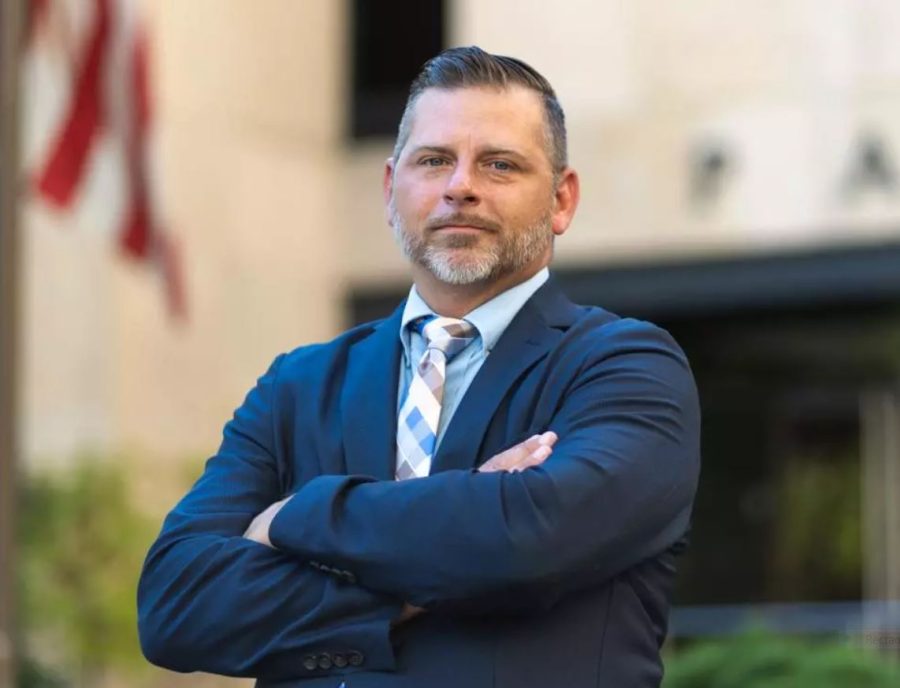
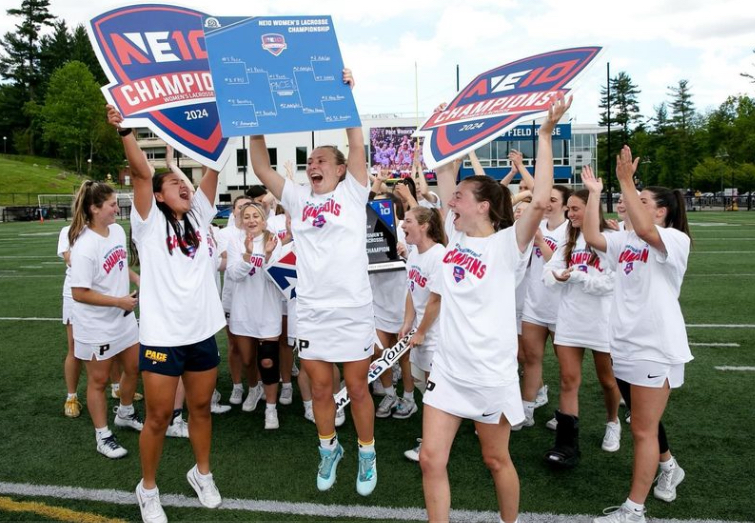


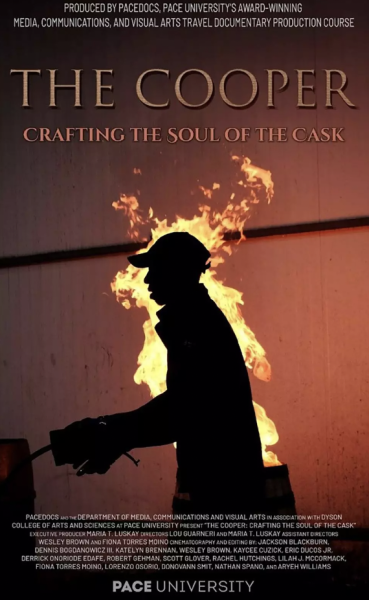
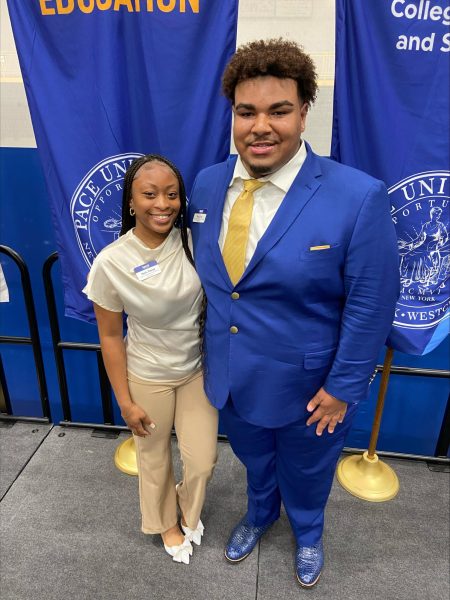
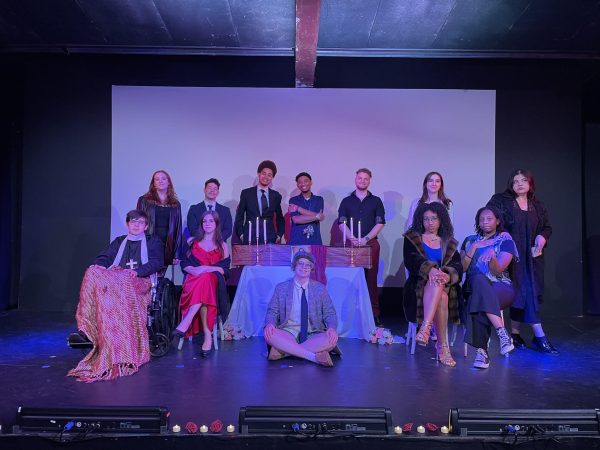

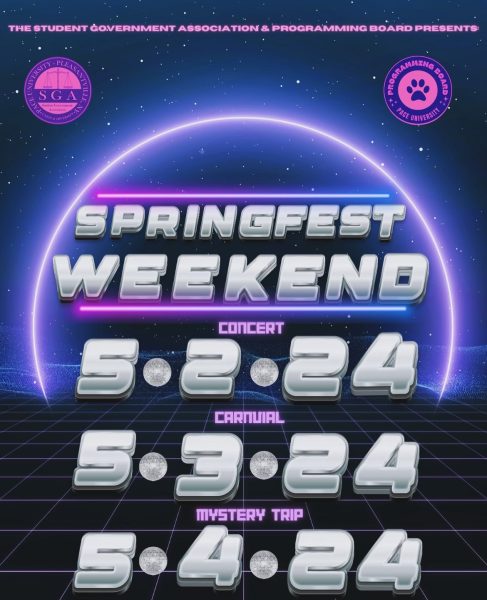

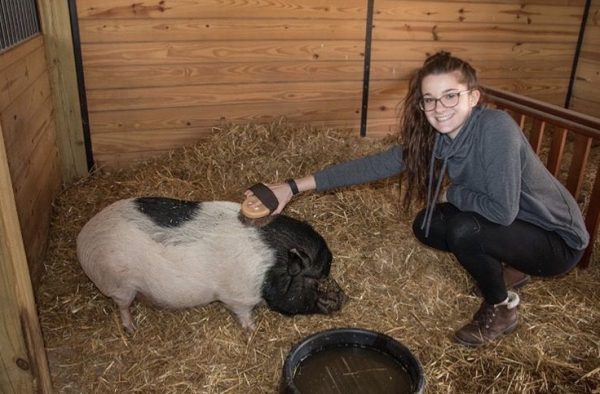

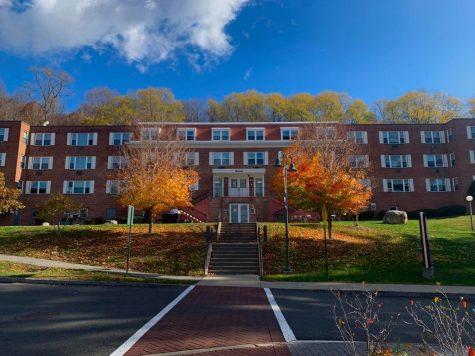
Liz Kerins • Dec 22, 2022 at 12:17 pm
Stony Brook’s loss is Pace’s gain. Jeff is so incredibly dedicated to his students 24/7 and sets a wonderful example for all. Best wishes Jeff!
isobel breheny • Dec 16, 2022 at 12:38 am
love love love it ! the article ~ but you almost lost me at 94.7 lol 😉 inside joke, great Dean who help my son navigate college and a great colleague to work with. Isobel